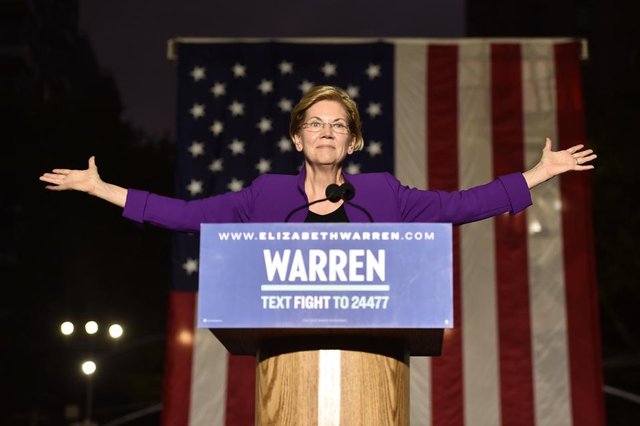Elizabeth Warren Launches An “Anti-Crypto Army” Is Hillary Clinton Going to be the General?

A prominent investor in the world of bitcoin and cryptocurrency has proposed that the recent banking crisis may have had its roots in a campaign by state-level entities against banks that are supportive of digital assets. Meanwhile, Elizabeth Warren, a powerful Democratic senator, has indicated that she is assembling an “anti-crypto army” as part of her re-election bid, in response to a warning issued by the crypto advocacy group, Coin Center, that a crackdown on the social media platform TikTok could lead to a prohibition on Bitcoin. In a recent tweet, the former U.S. presidential candidate expressed her dedication to “putting our government on the side of working families,” and she has wholeheartedly embraced the moniker “anti-crypto army,” ascribed to her in a recent Political profile.
As a member of the Senate Banking Committee, she is responsible for overseeing the U.S. Securities and Exchange Commission (SEC). Elizabeth Warren has been leading the charge on a series of bills aimed at curbing the growth of bitcoin and other cryptocurrencies in the last year. In December 2022, Warren introduced the Digital Asset Anti-Money Laundering Act, stating that “rogue nations, oligarchs, drug lords, and human traffickers are using digital assets to launder billions in stolen funds, evade sanctions, and finance terrorism.” She added that the proposed legislation would “help close crypto money laundering loopholes.” This move has caused concern within the crypto industry, especially since the U.S. Treasury Department’s Office of Foreign Assets Control (OFAC) blacklisted Tornado Cash, a crypto mixing tool, last summer. There are fears that this could be the beginning of more enforcement actions to come.

THE RESTRICT ACT , which has been introduced by Senators Warner and Thune, seeks to prevent or impede financial transactions and holdings involving foreign adversaries that could jeopardize national security. While the legislation primarily targets companies like TikTok and Instagram, the bill’s language has the potential to obstruct or disrupt cryptocurrency transactions, and in extreme cases, even restrict American access to open source tools or protocols like Bitcoin. The Act, however, has several issues, some of which arise from its similarity to the Office of Foreign Assets Control (OFAC) regime, while others stem from its differences. The legislation creates a redundant system that parallels OFAC without a clear rationale, significantly curtails the ability of affected parties to challenge actions that raise due process concerns, and unlike OFAC, it does not contain any provisions to protect freedom of speech.
The RESTRICT Act shares conceptual similarities with the International Emergency Economic Powers Act (IEEPA), which empowers OFAC to block Americans from conducting transactions with sanctioned foreign individuals. In essence, the RESTRICT Act would establish a parallel sanctions regime administered by the Secretary of Commerce alongside OFAC’s existing regime, which is overseen by the Treasury Secretary. While Coin Center acknowledges the legitimate use of OFAC’s powers to block transactions with actual foreign adversaries, such as transactions involving Iranian individuals holding private keys to a Bitcoin address or North Korean ransomware payments laundered through custodial mixing services, we are deeply concerned about the potential for an overbroad interpretation of those powers that could lead to the prohibition of entire categories of technologies without any actual foreign adversary holding a proprietary interest in the technology as a whole. OFAC’s recent decision to add Tornado Cash immutable smart contracts to the SDN list exemplifies this concern. The RESTRICT Act authorizes the Secretary of Commerce to block transactions in which foreign adversaries have an interest, similar to IEEPA’s directive to OFAC. We would not object to the narrow use of this power to target specific Bitcoin transactions involving particular recipients. However, if the Secretary of Commerce were to adopt an unreasonable and overly broad interpretation of “interest,” arguing that the entire class of Bitcoin transactions is a category of transactions in which foreign adversaries have an interest, we would contest such a designation in court, just as we are currently challenging OFAC’s designation of Tornado Cash. On balance, we would prefer not to have these expansive and potentially abusive powers wielded redundantly by either the Commerce Secretary or OFAC, particularly since IEEPA already confers broad authority on the administration to block transactions with foreign actors that threaten U.S. interests.
In summary, the RESTRICT Act is similar to the International Emergency Economic Powers Act (IEEPA) in that it grants broad powers to the executive to block or disrupt transactions with foreign adversaries that pose risks to national security. However, there are some differences between the two acts, such as the lack of a statutory carve-out for transactions dealing primarily in information and protected speech activities in the RESTRICT Act, and the ability of the Secretary of Commerce to make prohibitions without the need for the President to first declare a national emergency.
Furthermore, the RESTRICT Act limits judicial review to the D.C. Circuit and exempts agency action from review under the most relevant sections of the Administrative Procedure Act, which could make challenging abuses of power more difficult. This is a concern, particularly for the cryptocurrency industry, as an overbroad interpretation of the act could potentially ban Americans from using entire classes of technologies like Bitcoin without clear justification.
The lack of a statutory limitation on the RESTRICT Act’s targeting of transactions related to information and information technologies raises constitutional concerns, and the act may be challenged as facially unconstitutional should it become law. Coin Center is advocating for a cautious approach to the legislation and will consider a court challenge if it is ever used to sanction open source crypto technology.

Blockchain News World is a brand new platform being created by Veteran Blockchain Writers, Developers, Investors, and Marketers. Blockchain News World will be launching a layer one blockchain once our community has grown and we reach a certain amount of followers. All of our news articles are written in house by our top Cryptocurrency and Blockchain experts. None of our articles are written to “promote any type of project”. We are here to bring you REAL news in the Blockchain Industry. Find our community on Telegram at https://t.me/blockchainnewsworld Our Twitter is at https://twitter.com/BlockNewsWorld and our Website is being built and launched at https://www.blockchainnewsworld.com/ Our Steemit account is at https://steemit.com/@blockchainwriter & our Medium Article Account is at https://medium.com/@BlockchainNewsWorld
Blockchain News World’s future development plans are to build out a full layer one Blockchain Ecosystem focused on Freedom of Speech and Decentralization dAPPS to substitute centralization platforms like YouTube, TikTok, Twitter, Fivvr, and other major platforms but FULLY DECENTRALIZED! Here, the users profit from using the platform and have control over ALL changes via governance token. We want the users to have full control over ALL changes made in the project and in all of our new dAPPs built on our layer one Blockchain built by our developers and team through proposals and user’s voting. Our platforms will compensate Content Creators, Developers, Marketers, Telegram Admins, and other Blockchain Jobs. This will be built out later on our road map after our community and online presence has grown! Early adopters and users who help the platform grow before we launch our Blockchain will be compensated accordingly.
Disclaimer: The information provided in this article is for educational and informational purposes only. It does not constitute investment advice, financial advice, trading advice, or any other sort of advice. You should conduct your own research and consult with a professional before making any investment decisions. We are not responsible for any investment decisions you make based on the information provided in this article. Investing in any cryptocurrency or token involves risk, and you should only invest money that you are willing to lose. Please contact your local financial advisor before making any type of decision.
Blockchain News World https://www.blockchainnewsworld.com/ & Telegram at https://t.me/blockchainnewsworld #crypto #blockchain #USTC